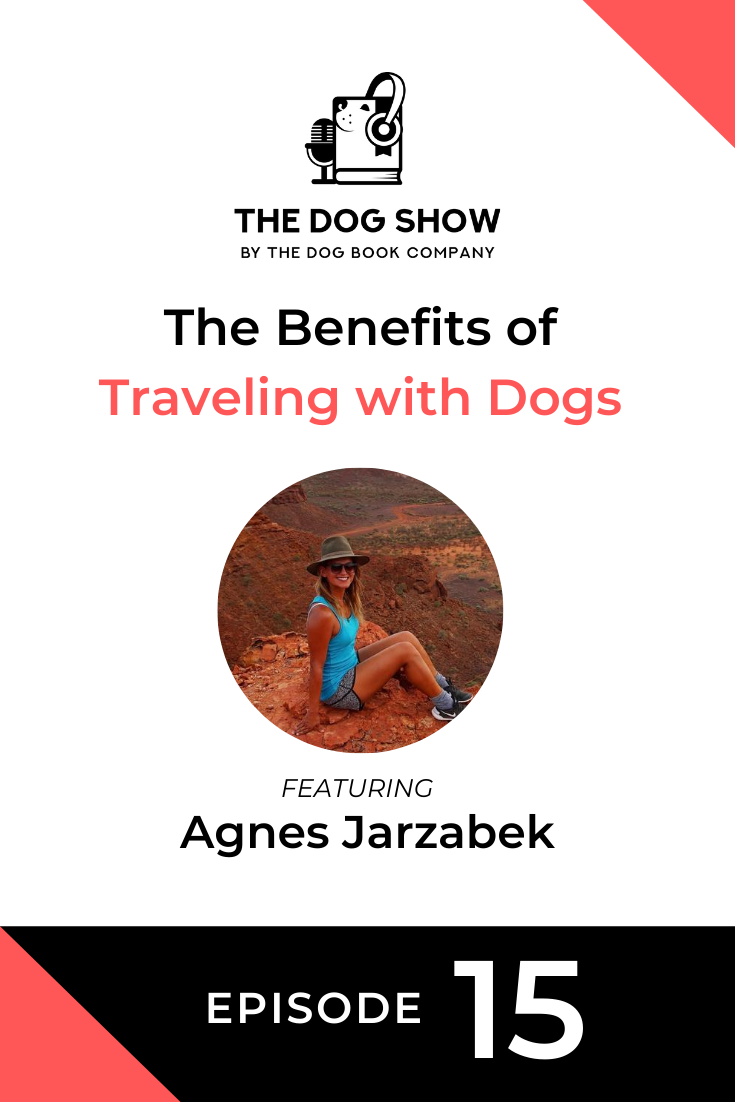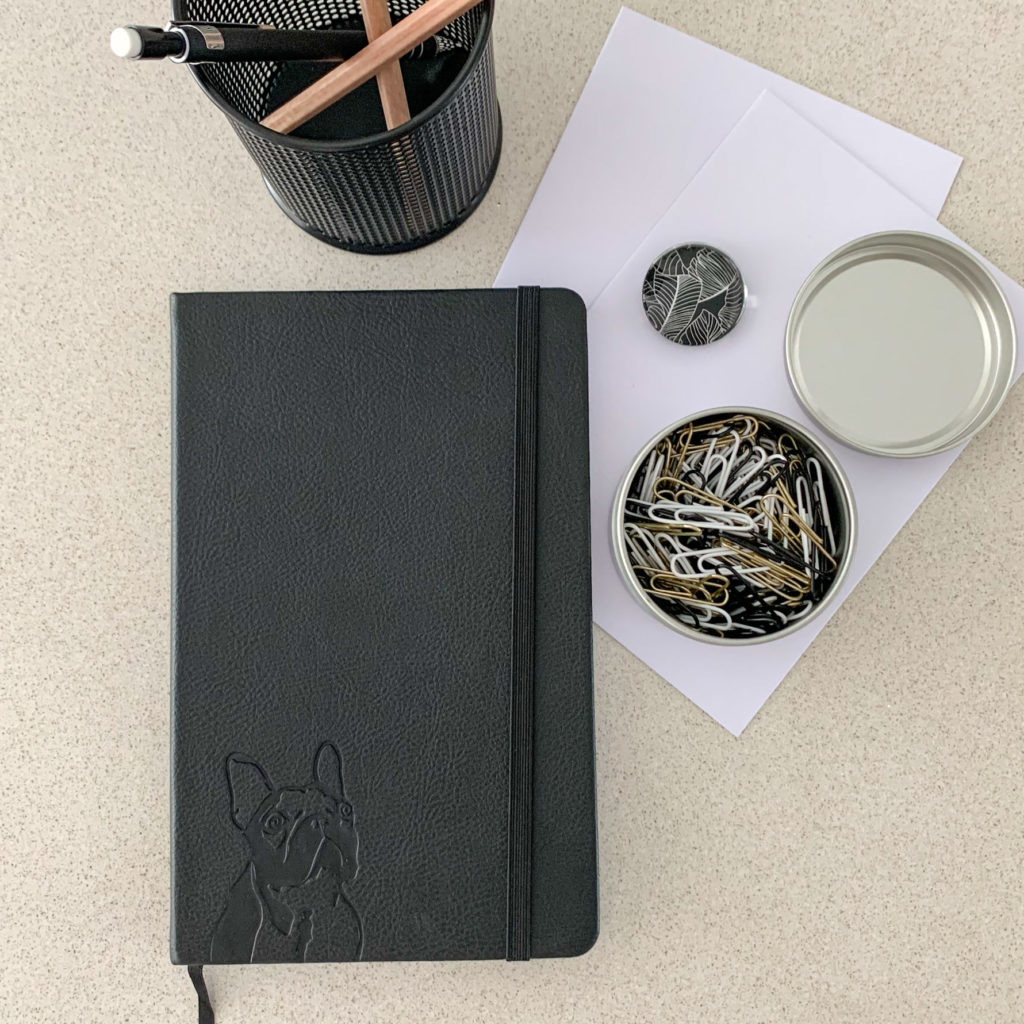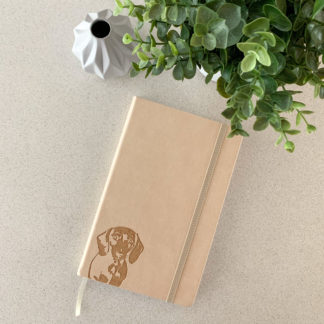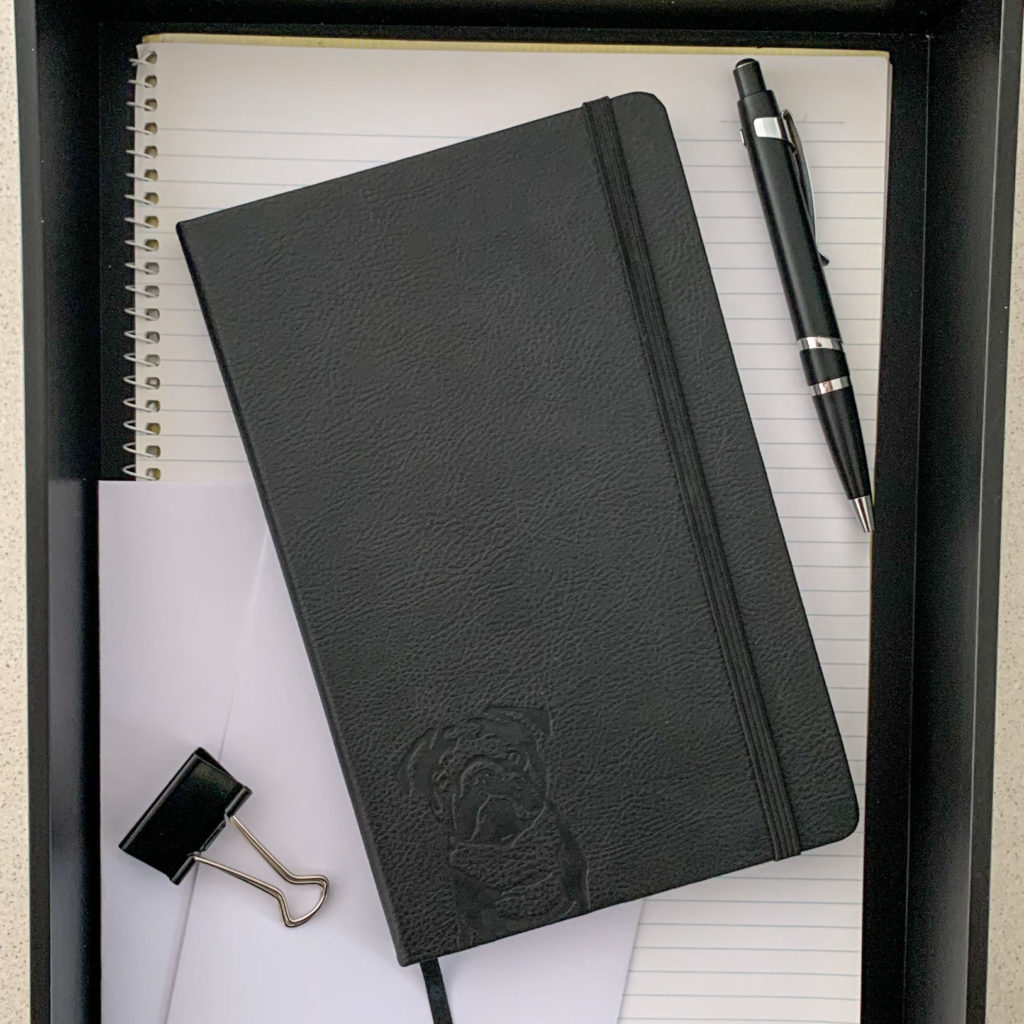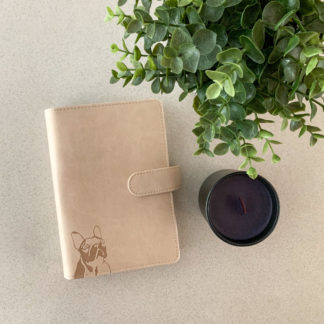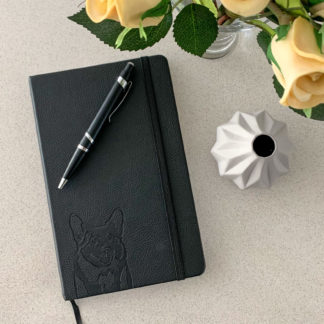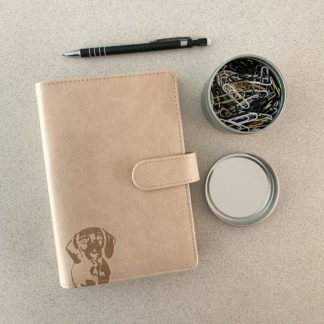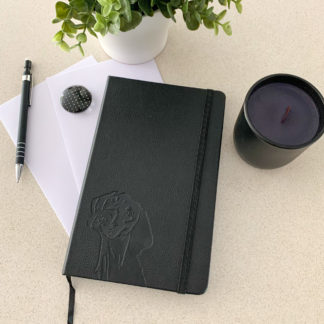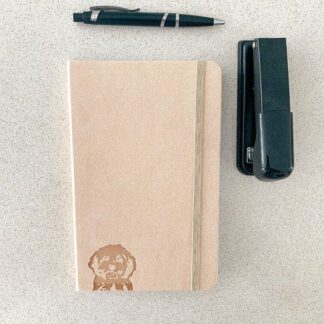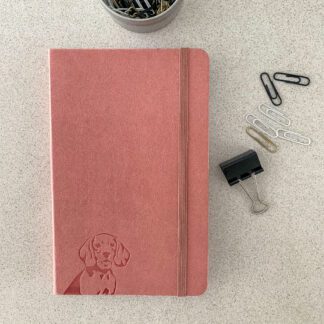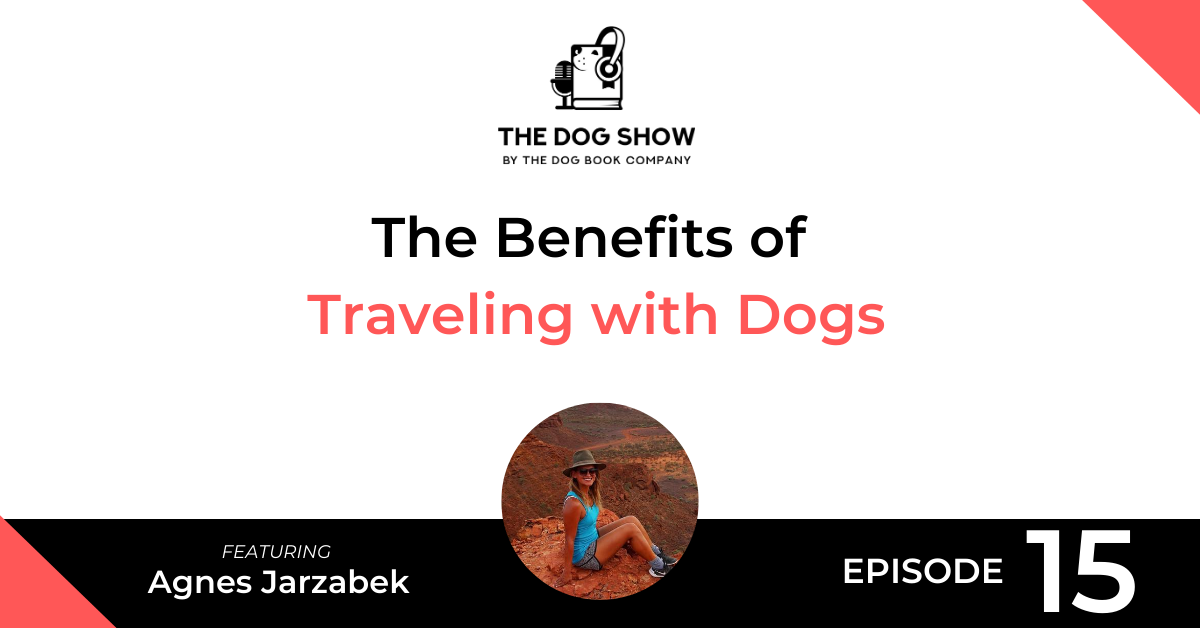
Have you ever considered traveling with your dog?
If so, you’ll love this interview with Agnes Jarzabek.
Agnes is the inspiration behind Travel Australia with Dogs, a thriving community of over 15,000 dog lovers who like to explore and travel Australia with their dogs.
In the interview, we talk about the benefits of traveling with your dog and explore some helpful tips on taking your first trip.
Find out more about Travel Australia with Dogs here:
- Travel Australia with Dogs Facebook Group
- Travel Australia with Dogs Facebook Page
- Travel Australia with Dogs Instagram
Listen
Watch
Read
Will: This episode of “The Dog Show” features Agnes Jarzabek. Agnes is the inspiration behind Travel Australia with Dogs, a thriving community of over 15,000 dog lovers who like to explore and travel Australia with their dogs. In the interview, we talk about the benefits of traveling with your dog, and explore some helpful tips on taking your first trip. Agnes, thanks so much for coming on “The Dog Show” today.
Agnes: Thanks for having me.
Will: Yeah. It’s great to have you. I just want to start out by asking a bit more about your dog. So you’ve got a Border Collie cross Golden Retriever, I believe, called Sergeant Pepper?
Agnes: Yes, I do. He is my 12-year-old supersized Border Collie. When people meet him, they usually can suss out the Border Collie side in him, but they’re always kind of curious about what the other side is. He is quite the well-traveled dog. He’s come over to Australia with me from Canada. That was back in 2012. So he’s been here for quite some time now. It was a bit of an adjustment for him, because being a Canadian dog, he definitely has that undercoat, and when we first brought him over, the seasons were opposite. So he was just molting like crazy in the Australian weather.
Will: Yeah. That’s interesting. So, was there a noticeable, like, deshedding period or, like, a readjustment period?
Agnes: Definitely. So it was May when he came over, so going into winter here, and then back home, it’s spring. So, like, he just had these tufts, and these moments where it was just like, I’d never seen so much fur come off of him. And then he looked really skinny and lanky because of all the fur that he was missing, and then it would just puff out again. So it took his body a little while to adjust, but he definitely got there in the end. It just required a lot more extra grooming.
Will: Yeah. I can imagine. So the photos I’ve seen of him, he does look like a Border Collie. I guess he’s got the black and white fur and that kind of stuff. But what are some traits that he’s got from both sides of the breeds?
Agnes: Well, he is getting older now, so he’s definitely slowing down. But, in general, I would say that he had these, like, crazy spurts for, like, about a half hour where we call it, like, his Border Collie side, supersonic Border Collie come out, and then he just passes out for the rest of the day, kind of like in that lazy, stereotypical Golden Retriever trait. He really likes to lay down on your feet, anywhere where you might be cooking, that you might trip and accidentally drop something. He’s there to help. Yeah. Those are gonna be the two. So, crazy hyper, and then crazy lazy.
Will: That sounds like a lot of dogs, I think, though. And I haven’t, you know, had every dog breed, obviously, but, you know, a lot of dog breeds have those kind of high-burst energy moments, and then can also relax. But, you know, Border Collies are renowned for being very, very active dogs.
Agnes: Yeah. I think we got pretty lucky with that, though. Like, as long as we give him the consistent attention, consistent energy relief of walks and all that kind of stuff, and swims, he’s really chill the rest of the time. But he’s also really smart. He’s too smart for his own good sometimes.
Like, when we have to give him his heartworm pills and stuff, we changed providers, I don’t know the name of the brand that we’re on right now. But he got really cheeky with it, so we tried hiding it in some lunch meat and different things. And it was, he knew that it was there, so I’d have to give him, like, a tester sample, and he’d try it with his front teeth and that kind of stuff to see if there was anything in it. And then he learned that trick, and then I had to put peanut butter in it and try and hide it. And then he would just spit everything out, roll it around with his nose, and then he’d eat everything but what he needed to eat. Like, it’s just insane how he learns.
Will: Yeah. We smother our, like, pills in cheese at the moment, which, like, you get a big enough coating so it’s impossible to see the pill, and then just hope that…I mean, to be honest, our dog barely chews things anyway, so it just kind of goes straight down. It’s almost like a duck trying to swallow something.
Agnes: So sometimes there’s two of us that tackle it. So I’ll prep it and I’ll walk out of the room, and then my husband will come in and be like, “Oh, what’s this?” As if it’s just like something he’s about to eat. So then the dog gets really excited about it.
Will: Yeah. That’s a good way to do it. Just make him feel comfortable. So, how did you stumble across Sergeant Pepper initially? Did you get him as a puppy, or did you adopt him? How did you find him?
Agnes: So we got him as a puppy. My husband was working in the northern part of Ontario, and it was through a friend who he was living with that we came across Sergeant Pepper. At the time, in the litter, we saw him and his sister, and it was like night and day. So she was the Golden Retriever, like, just pure golden colors, and he was the Border Collie, black and white. Like, it was just incredible to think that they came out of the same litter. But Sarge really reminded me of my childhood pet, Blackie. So that really stuck out with me. And he seemed a bit more docile than she did, so we went with him. That docile behavior did not last. He was a bit of a terror as a puppy. He really liked to bite on stuff, and grab your heels and pants, and that kind of usual puppy stuff.
Will: How did you find training him? I mean, I know all puppies have those kind of tendencies and stuff like that, but Border Collies are traditionally good to train, right or?
Agnes: Yeah. He’s very stubborn. So that first year, he knew what you wanted, but he didn’t wanna do it. But once he hit that year mark, he just snapped into things and just started doing them naturally. And it was just so much less work.
Will: Yeah. I know. I felt like that first year, it probably felt like that about the same for us as well. Like, the whole time, it just feels like it’s never gonna end. It’s like, “Come on, mate.” I had the same experience. They know what they should be doing, but for whatever reason, they decided they don’t want to, or they wanna wait to get something off you. And then as soon as it all, like, it triggers, and they start to get it, it’s quite amazing. It really changes life. I mean, having a puppy is like, I don’t wanna compare it to being a parent, but it’s quite a lot of work in that first 12 months.
Agnes: I can only imagine, but, yeah, they’re just cheeky at that age. And the worst, I think, is just knowing that you can see that they know what you want, but they just don’t wanna do it.
Will: Yeah. So, you came to Australia with Sergeant Pepper over eight years ago now, and since then you’ve traveled all around Australia. I mean, I was checking out your Instagram page. It’s just really cool. So, it’s called Travel Australia with Dogs. Is that right?
Agnes: Yeah. So, that is more the community page. I share some of my stuff, but my big thing is about sharing other dogs that are also traveling around Australia. So I do my best to share my stories in the Insta Story section, and then I wanna show that there’s more than just me out there. There’s so many dogs out there traveling Australia.
Will: Okay. That makes sense, because I was looking at all the dogs going, “Does she actually, like, know all these dogs?” I mean, this sounds like an amazing lifestyle [inaudible 00:07:28] But it does seem like Sergeant Pepper’s seen, you know, probably more of Australia than, like, a lot of people have.
Agnes: He gets that a lot, actually.
Will: So, what kind of got you into doing this in the first place? What attracted you to, number one, travel Australia with your dog, or travel Australia at all, and also share the experience with people?
Agnes: So, when we brought Sarge over, that meant that we also didn’t have any family here in Australia. We fell in love with the idea after we got our permanent residency sorted of traveling around Australia and seeing the country. We met lots of people who had done the backpacking thing and then come to Sydney and gone to work. But we never did that. We came to Sydney and we worked. So we wanted to kind of break away, see the rest of the country that we were calling home, and that’s when we decided to travel around Australia.
Now, we brought Sarge all the way over from Canada, so it wasn’t an option to just leave him in Sydney while we traveled around the country for a year. It was just not something that we would have done, but we also didn’t have anyone else to leave him with. So it’s what we do. It’s what we’ve always done. And we’ve always managed to find a way.
And I think that a lot of people struggle with the idea of traveling around Australia with their dog because there’s so many people telling them that they’re gonna be missing out on things, but we found that it was kind of the opposite. The more you got out there, the more people you met and you spoke with, the easier it became to find those places that were actually pet-friendly. There’s so much stuff that’s not on the internet. It’s, you have to be there to see that a trail’s pet-friendly. Like, it’s not advertised online a lot.
Will: Yeah. So, I mean, did you have, like, a camper van or something, or were you traveling by plane, or how did you kind of get around the country?
Agnes: So, we had our old 1975 Viscount Caravan. We renovated it a little bit. It was only 13 feet, so we called it often our mobile dog house.
Will: Okay. Yeah. Well, I guess these days, as well with Airbnb and everything, I’ve noticed there’s more places that are pet-friendly than they used to be. So there’s definitely more opportunity to travel with your dog.
Agnes: Yeah.
Will: We’ve certainly dipped our toe into going places within, you know, an hour or so, or a couple of hours of where we live, but the idea of going interstate and stuff is…I mean, it sounds like a great lifestyle for a period of time, really.
Agnes: It is. And it’s quite special also not being on a certain time frame, so the areas that you really fall in love with, you can stay for longer and explore more, and the areas that might not quite suit, you can just keep going until you find the next one.
Will: I think it’s, like, especially with everything that’s going on in the world right now, you know, the lockdown, and COVID, and everything, like, international travel is something which, who knows when it’s gonna be, like, a really open thing anymore? I think it’s a good opportunity for people to see their own country.
Many listeners of the show are from the United States or other parts of the world, obviously a lot of people here in Australia. I mean, I myself, I think, always tell myself I should see more of Australia, because it’s a beautiful country, but you’ve got to just actually get out there and see a lot of it, right? And taking your dog. That’s actually one thing a lot of people…and I’ve made this excuse many times myself, like, “Oh, I’ve got a dog. I can’t really, you know, go traveling or something like that.” But you can find a way, as you said.
Agnes: You can. Even if you want to see things like national parks, there’s so many different ways of doing it. Like, a lot of the time, for us as campers, there’s parklands, or state forest, or something that’s bordering the national park, and oftentimes it was free camping right next to it. So those areas were just as beautiful, if not even sometimes more beautiful, because fewer people visited them.
So, like, being with a dog, sometimes people see it as a disadvantage, but sometimes you go to those spots that other people wouldn’t naturally go to, because they don’t have that requirement. So they would go into the national park and camp in the most popular spot that’s in that national park.
Will: Did you travel around Ontario or Canada with Sarge at all when you were back home?
Agnes: He did a fair bit of travel around Ontario with us. He also went down to New York State with us as well. So, technically he’s been in three different countries. So that’s his claim to fame. But when we were in Ontario, we just took him naturally everywhere with us. If we were going to a friend’s for a weekend, or if we were going camping, like, we didn’t really think a lot about it. I even remember a big trip that we did, a camping trip up north. I think we were driving, like, 13, 14 hours. And on the way back, we were like, “Eh, don’t really feel like camping.” So we pulled over to a roadside motel, and there was no dramas having a dog with us. We just paid an extra 20 bucks for a cleaning fee, and that was that.
Will: Yeah. That’s pretty cool. I guess a lot of people would assume that, you know, a motel or something, you just couldn’t take a dog there, but you never know, right? So, what would you say are the benefits of traveling with your dog? Like, for people out there that maybe haven’t done it before or are thinking about doing it, yeah, what are the main benefits?
Agnes: My favorite thing is that dogs make an excellent icebreaker. So you either run into people that have pets and want to talk to you because they can relate to you, or they have their dog back at home, someone looking after them. They just really help that conversation go, and help you feel more comfortable along your fellow neighbors. They also bring a certain level of security. So if you’re camping at night and you’re in an area that you’re not quite sure of, I mean, if they hear a noise, you’re gonna know it.
Will: Yeah, that’s true.
Agnes: We had one campsite where you would have thought that something terrible was happening, but there was just a sheep outside, but Sarge was just off his rocker seeing it just outside of the caravan. Same thing happened when we had some wild horses one night at a campsite. Like, I had no idea what was going on, but I thought the world was ending because of the way that he was barking scared.
The other thing is that they offer great companionship. We met a lot of gray nomads out there who may have lost their significant other. And whether it’s just that they’re traveling alone and they have that pet, or, even as a couple, of us traveling, sometimes Brad wouldn’t be around, so I’d still have Sarge. So that’s just a nice comfort knowing that you’ve got someone there.
They also keep you active. So, it’s so easy to get to a campground and just wanna be lazy, sit down and have some food, and just, like, do nothing. But having a dog forces you to get up, go for a walk, which I find to be the best benefit, because sometimes you end up seeing something around you that you otherwise would have missed.
Sometimes it’s, like, an animal that you might stumble across, or, I’ve even seen on Instagram some people sharing how their dog wanted them to go out, and they ended up seeing, like, the aurora borealis. Like, obviously this was in North America. But still, like, just those moments, those things that you wouldn’t expect, or you probably would have been like, “Nah, I’m too tired.” Like, you just never know what you’re gonna see when you’re out with your dogs.
And then I would say the final thing, in terms of benefits, is the fact that if you are traveling and you don’t know what to do with your dog, it could save you some money essentially, because you don’t have to worry about finding someone to look after them or paying for kennel fees and that kind of stuff. So it can save you a little bit of money.
Will: Yeah. That’s a great point, actually. Like, just taking it with you can save you the hassle of trying to find a sitter or something for an extended period of time, and not make you worry while you’re away the whole time about them.
Agnes: Yeah. Because, depending on the kind of sitter that you get, like, if you don’t have family or friends to help pitch in, those costs can add up pretty quickly.
Will: The exploration one, as well, resonates, because I think, even in the area where I live, every now and then when I take my dog for a walk, I’ll discover somewhere which I didn’t know existed, and it’s like if you’re out traveling and camping, you know, in remote areas, and you just happen to go for more walks, you’re gonna find, like, so many cool little nooks and crannies which you probably didn’t know were there.
Agnes: Yeah.
Will: One benefit you didn’t mention, which I thought of when we were about to do the call was the benefit for the dog as well. I mean, like, day to day, they’re just craving for that walk, or run, or whatever they’re getting, and they’re just so much more content and happy afterwards. And I know our dog gets more anxiety and just needs, like, without the exercise, needs stimulation, and taking them on a beautiful trip like that and getting them outdoors is just gonna give them so much enjoyment.
Agnes: Definitely. I always say that a tired dog is a happy dog.
Will: That’s very true. It’s a happy owner as well, because they’re kind of, you know, content and sleepy when you’re at home. Yeah, yeah. I imagine traveling with a dog is more complicated than just going by yourself, I guess. Would you agree?
Agnes: I don’t like the use of the word “complicated.” I would say that when it comes to traveling with the dog, you just have to be a bit more flexible. But if there’s things that you wanna do, like, say you wanted to go and do some of the four-wheel-drive tracks in Kakadu and that kind of thing, you’d probably have to arrange a pet sitter so that they look after them so you can go into the park and stay in the park, and that kind of thing. But I’d say that being more flexible is almost… I don’t have kids, but I would relate it to that, like, I know some people who travel with young kids, and they have to make sure that they have the kids down for naps and stuff at certain times, or they want to do things that suit their interests. So you still kind of plan your trips around someone or something. So, just being a little bit more flexible with how you travel, where you travel, when you travel, like, traveling outside of peak season is fantastic when you have a dog, because most caravan parks that might be kind of funny about it are so happy to have someone come stay because otherwise there’s, like, no one there.
Will: Yeah. And especially even now, as well, with the restrictions and stuff going on, I imagine a lot of places are looking to get people in to their areas as well with domestic travel. So that’s probably an added incentive as well to get out there. I was thinking as well about, like, I guess the travel you’re talking about is domestic travel where you might, you know, take a caravan, or you drive in a car, or something like that. It becomes more complicated, I guess, if, and I know you don’t like the word “complicated,” but, like, traveling on a plane.
So, for example, we have a French Bulldog, and the flat face breeds and some other breeds, really, you pretty much shouldn’t take them on planes unless you want…like, because they are at high risk in that environment. You know, most dog breeds are okay in that environment, but, you know, that’s something that owners should really be thinking about, is how they’ll travel with their dog round. Like, so does Sergeant Pepper, like, go in a crate or something in the caravan, or does he just roam around? How does he travel?
Agnes: No. So he stays in the car with us, which he loves, especially on hot days, because that means that he gets to sit in the air con. But we do have a harness for him, and we do buckle him in on certain roads, because we learned really quickly that going over cattle grates, or grids, he’s not a fan of. And I was driving by myself and there was the one time where he wasn’t buckled in, and I went over one of those things, and he was just trying his best to get into the front seat. And you don’t wanna get into an accident distracted by your dog.
So we just found that to be something that works really well, but usually he’s just really chill sitting in the back seat. Like, he’s so used to driving around with us. That’s literally, like, if he’s ever anxious at camp, he wants to go into the back of the car, like, and sit in the back seat. He’ll be calm, take a nap. Sometimes we have to open up both doors and push him out one end because he just doesn’t wanna come out.
Will: Yeah. And I guess, because he’s so used to it, then he’s probably good with all those little jolts and things like that. But if an owner’s new to traveling with their dog, you know, a harness sounds like a great idea because, like, it’s an added level of safety as well.
Agnes: Yeah. And taking it in shorter trips, right? Like, if your dog’s not used to being in the car, even just, instead of walking to the dog park, grabbing the car, throwing him in there, driving, and then at least that they know there’s something positive at the end of it, too, so then they get excited. So it’s not like you’re just taking them in for a car ride to the vet, and then they associate with the car with something negative, something bad’s gonna happen.
Will: Yeah. That’s so true, actually. Like, just thinking back over our experience with, like, getting our dog used to the car, when they were going to a positive experience, that kind of really weaned them onto it, I guess, in a way.
Agnes: Yeah. Definitely.
Will: Okay. Now, for something a little bit fun, what’s your most crazy or memorable story with Sergeant Pepper when you’ve been traveling?
Agnes: I don’t know if it would be crazy. One of my favorite things with Sergeant Pepper while we were traveling was that I actually taught him how to surf. And this is only, like, two years ago. So, at, like, age 10, I didn’t think that I’d be able to get him on the board. But he was, very surprising to me that he just adapted, and then he just sat there like he was the king while I paddled. But, I mean, he’s 32 kilos, so every now and then when he did shift, like, his bum and stuff on the board, you really have to watch your balance or otherwise you’re just going in.
Will: That’s cool. Like, I guess, everyone always thinks, like, dogs, as they get older, and, I guess, people, to a certain extent, can’t learn new things, right? But it’s cool to know that put in, like, new environments and everything, that they could still learn something new.
Will: Yeah. Definitely. And, I mean, one of the other things that really sticks out for me is actually more from when we first brought him to Australia. The very first time we took him to a pet-friendly beach, and he went into the ocean, he didn’t quite understand what waves were. Like, having lakes and stuff growing up, it’s not the same sort of waves, or the movement of the water is just very, very different.
And he chased the rip out, and this big wave curled, and I just remember him looking up being like, “Oh, crap.” And it just came, and, like, I have this photo of him, like, trying to pull himself out. And, like, he came out of the water and he didn’t go back in straight away. Like, he waited a little bit. And then he kind of sussed the water out for a bit. I mean, he’s over that now, but it was just a hilarious first-time experience for him.
Will: I guess that’s the equivalent of getting thrown in the deep end, right?
Agnes: Yeah.
Will: Like, he learned pretty quickly that that wasn’t what he should be doing with the waves crashing in. Okay. So, if listeners could take away, you know, one big thing about traveling with their dogs from the show today, what do you think it would be?
Agnes: I’d say, don’t be afraid of traveling with your dog because people tell you that you’ll be missing out. Australia is a beautiful country, and it’s a very big country. And I think that it’s often easy to start believing that it’s all one big national park, but it’s not. There’s so many incredible places outside of national parks that you can visit.
And it’s one of the things that strikes me every time I hear people saying, “Oh, don’t take your dog. You’re gonna miss out.” But I don’t believe that’s true. You have to be a bit more adaptable, and you might have to change the way that you travel a little bit, but it’s possible, and it’s so worth it. And the bond that you create traveling with your dog is super special.
Will: Yeah. Absolutely. And I think one thing you said earlier which resonated with me, it’s like, just start. Like, do something small first, even if it’s a half-an-hour trip somewhere. Maybe then you can kind of upgrade to hiring a camper van or getting an Airbnb somewhere which is a little way away.
Agnes: Doing stuff like that is a great way to also suss out how well your dog does traveling, because I know for some people, some dogs just don’t like it, and then they don’t adapt. But for the most part, I find that if you just slowly edge them into it, it becomes pretty easy.
Will: Yeah. And it might be like the car thing. Like, initially they might be a bit uncertain or anxious about being in a different place, but then you do it a few times and they start to get used to it.
Agnes: Yeah. And they get all that extra attention and exercise. What’s not to love?
Will: Yeah. Absolutely. Okay. Well, cool. So, thanks for all the tips today about traveling with your dogs. It’s actually inspired me. I feel like I wanna organize a trip sometime soon now. Where can people find out more about what you’re doing, everything you’re doing in Instagram, and sharing your story, and everything like that?
Agnes: Yeah. So we’re on Instagram, @travelaustraliawithdogs. We’ve also got a fantastic community of people. We’ve got over 15,000 people over on our Facebook group. And in August, we’re going to be launching a website so that we can make things easier for people looking for resources, talking about where you can go and what you can do.
Will: Perfect. There is a website which is live at the moment where you sell your stickers. Is that where you’re gonna be having everything or…?
Agnes: It’s not gonna be that website, but it’s gonna be a website that’s almost like that website.
Will: Okay. That’s cool. But, anyway, I’ll share the links to the Facebook group, and Instagram, and everything so people can connect with you and then anticipate the launching of the new website.
Agnes: Yes.
Will: Sounds very exciting.
Agnes: Very excited.
Will: Well, thanks so much, Agnes, for coming on the show today. It’s been really enjoyable.
Agnes: Thanks for having me.
From Our Store
-
French Bulldog Coffee Table Book – The Book of Frenchies
From: AUD $59.99 Add to cart -
Dachshund Coffee Table Book – The Book of Dachshunds
From: AUD $59.99 Add to cart -
Pug Coffee Table Book – The Book of Pugs
AUD $59.99 Add to cart -
French Bulldog Notebook – A5, Hardcover, PU Leather, 100gsm Lined Pages, Bookmark (Three Colours)
AUD $34.99 Select options -
Dachshund Notebook – A5, Hardcover, PU Leather, 100gsm Lined Pages, Bookmark (Three Colours)
AUD $34.99 Select options -
Pug Notebook – A5, Hardcover, Black PU Leather, 100gsm Lined Pages, Bookmark (Three Colours)
AUD $34.99 Select options -
French Bulldog Planner – PU Leather Exterior, Metal Loose Leaf Ring Binder, 100gsm Paper (Two Colours)
AUD $64.99 Select options -
Corgi Notebook – A5, Hardcover, Black PU Leather, 100gsm Lined Pages, Bookmark (Three Colours)
AUD $34.99 Select options -
Dachshund Planner – PU Leather Exterior, Metal Loose Leaf Ring Binder, 100gsm Paper (Two Colours)
AUD $64.99 Select options -
Vizsla/Weimaraner Notebook – A5, Hardcover, PU Leather, 100gsm Lined Pages, Bookmark (Three Colours)
AUD $34.99 Select options -
Cavoodle Notebook – A5, Hardcover, Black PU Leather, 100gsm Lined Pages, Bookmark (Three Colours)
AUD $34.99 Select options -
Beagle Notebook – A5, Hardcover, PU Leather, 100gsm Lined Pages, Bookmark (Three Colours)
AUD $34.99 Select options
